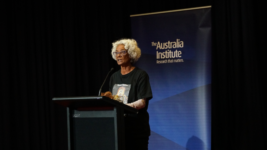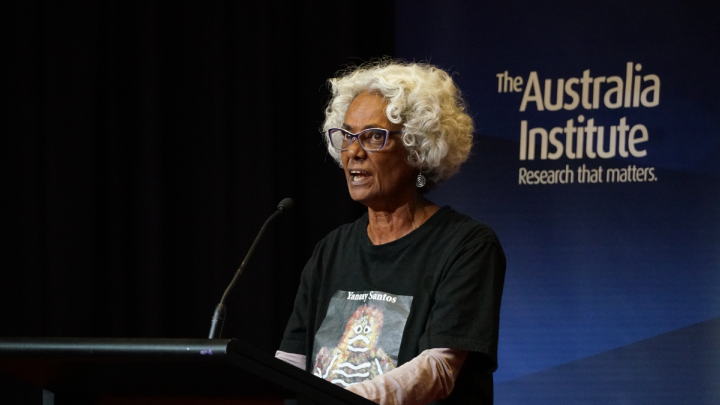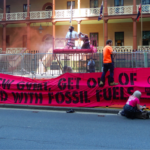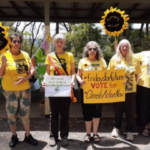Gomeroi Victory Over Santos: An Interview With Gomeroi Elder Aunty Maria “Polly” Cutmore

A three justice bench of the Federal Court of Australia ruled on 6 March that the decision of the National Native Title Tribunal to greenlight the Santos Narrabri gas project to proceed on Gomeroi Country on 19 December 2022, does not hold, as it had failed to consider all the factors involved.
The issue with the original NNTT determination was, whilst evidence from renowned climate scientist the late Will Steffen, regarding the effects that emissions from the Narrabri project would have on planetary climate, the tribunal didn’t consider this, as it solely focused on local impacts.
One might think local impacts would be enough, however, as gas giant Santos wants to drill 850 coal seam gas wells on Gomeroi County, including within the Pilliga Forest, and these wells will be drilled straight through the Great Artesian Basin: one of the largest freshwater reserves on the globe.
So, it was to the shock of many that the NNTT gave the go-ahead to the $3.5 billion project, of which the Gomeroi has been refusing for at least a decade now.
And Gomeroi elder Maria “Polly” Cutmore considers the Federal Court reversing this decision to be a turning point.
Gomeroi Ngaar: Bigan Ngaar
“In 2016, I got elected as a Native Title applicant at the nation meeting in Tamworth,” Aunty Polly told the Climate Integrity Summit, “on the condition that nothing was to be signed away without the nation’s consent. This was because the last applicants had done dirty deals with a mining company.”
On Wednesday, the Gomeroi elder discussed the way that claimants, not just the Gomeroi, are treated when negotiating on native title, as it’s a process that involves company lawyers aware of all the laws and details, while First Nations representatives are provided with as little as possible.
“It was hard at first going to the Santos meetings. The games they were playing with certain applicants. There wasn’t much room for our Law in the discussions,” Aunty Polly told the event held by the Australia Institute, which also featured the president of Kiribati and PM of Tuvalu as speakers.
“Santos even claimed there was no biodiversity in the Pilliga and there was no impact on groundwater,” the Gomeroi elder underscored.
“I also was shocked to find out there had been no gathering of knowledge and stories from elders or reporting of the cultural significance of the Pilliga.”
Turning point, not tipping points
Federal Court Chief Justice Debra Mortimer’s decision to reverse the ruling made by former NNTT president John Dowsett is welcomed, as he’d considered that in a time of an escalating climate crisis the impact the Narrabri gas project would have on the broader issue was of no importance.
Indeed, with the preservation of the environment now front and centre, not just for Indigenous peoples, but for a much larger portion of the overall population of the continent, all agree that humanity and planet are under threat of extinction.
Sydney Criminal Lawyers spoke to Gomeroi elder Aunty Polly Cutmore about the sense of empowerment the Gomeroi Nation is now experiencing, the way the NNTT process is set up to dupe Traditional Owners, and the path forward that she now perceives as clearing.

Aunty Polly, you spoke at The Australia Institute Climate Integrity Summit at Parliament House in Canberra on Wednesday.
And you told the 20 March gathering about the struggles of the Gomeroi people against the Santos Narrabri gas project and the underhanded aspects of the Native Title system.
On 6 March, Chief Justice Debra Mortimer overturned the 2022 decision of the National Native Title Tribunal to allow the Narrabri gas project to go ahead on Gomeroi Country.
How are you feeling about the outcome? What does the victory mean for the Gomeroi?
We are all feeling very empowered at the moment. The case is still going on. The decision realised that Gomeroi people aren’t selling out and First Nations people aren’t selling out for a pittance.
We still have that right to say “No”. Our land and water are still safe, which is wonderful for us.
What does Santos want to do to the land of the Gomeroi? And what would the consequences be for your people?
They were going to put in 850 wells. And that was in some of our most sacred places, but especially in our waterway systems.
We couldn’t allow that to happen, because it would have been devastating for the Great Artesian – to have poison pumped into it – and also, for our land.
Our food would be poisoned. It also means all the habitat of our animals would also be poisoned. It would be devastating for us to have that going on.
Some of the things that they’ve done out there are going to need environmental cleanup. Especially the drilled wells that overflowed at one stage. We’ve had fish kills down further.
All our river systems and our creeks: everything is connected. It would have been devastating for us mob in the Pilliga Forest and in the Narrabri region down further.
We can’t allow that to happen to our people down further.
As you noted in your address to the Climate Integrity Summit, you were appointed a Native Title claimant in 2016, after previous negotiations had been problematic.
And what you found was a system that saw fossil fuel agents familiar with it attempting to negotiate with First Nations people unfamiliar with the system, and you infer this is likely going on in many cases across the continent.
So, how would you describe the way the Native Title system treats Native Title claimants in negotiations?
We are not given all the information. That needs fixing. A lot of the information is kept away from us, and what they really need to do is to come out and sit down with us first.
Don’t bring in people that don’t know us. Come and speak to the Traditional Owners, and we will let you know.
We know that we have new people living on our Country. We know we need to move forward in areas, but not at the destruction of our Country or our people.
So, are you saying that Native Title claimants are turning up to negotiations with fossil fuel companies without any preparation?
Yes, without everything put in front of us – without all the details.
We need to know the details, just like they needed to know all the details with the Voice. We need to know everything about what they are up to.
So, they’re giving you a little bit and saying decide on this, without telling you the whole story?
Yes. They say, “You have to fill our cup up over here, while we kill your fish.”
So, they’re filling our cup up with this money, this paper stuff, that does not feed us. It is not our medicine.
And this is happening in other native title negotiations around the country?
I do believe so. We have mob dealing with Santos and other gas companies around the area, and they’re all saying no.
So, what is the problem, if the Traditional Owners are saying, “No. You are going to damage our water systems?”
Especially with us women: water is women’s business, and we are telling you no. We are telling you, “The women know what is going on.” Please, listen to the women. They need to.
In your speech, you seem to convey that the Native Title system, and the situation on the ground relating to it, are coming to something of a crossroads, and this has to do with the two law systems operating on Country.
So, how would you describe the situation of the two laws operating now, and how might this be resolved?
We are going to have to sit down with our elders and discuss what Santos is going to bring back. We are going to have to look at our law and fix Native Title because it is not working.
They need to take in our law: Bigan Law/Gomeroi Law.
Now, they ignore it. We’ve been told over and over, that they are here to stay, we can’t beat them, and we are not going to win.
Well, we’ve proven that wrong.
Just with the Australia Institute and yourself, we have people that are going to listen to us – people that aren’t going to abuse us and use us.
We’ve had enough of that, and it is time for our Country to heal.
The way we can do that is that if they listen to us and our law.
So, do you think this is a turning point?
I know it is going to be a turning point. My heart, my ancestors and my people, do believe.
And lastly, Aunty Polly, these Santos negotiations have been ongoing for a decade now, having started in 2011.
So, what is the way forward after the Federal Court decision? Do the Gomeroi now have to keep fighting? Is there an end in sight?
There is an end in sight. I believe Santos are going to leave our Country. It is up to them, and like I said, they should do the right thing.
They should respect our vote. They should respect what the nation said.







